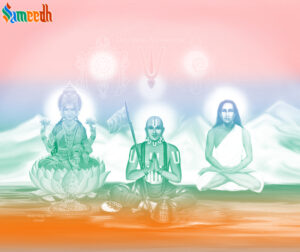The Sri Vaishnava Sampradaya is one of the major traditions within Hinduism, particularly within the Vaishnavism branch. It traces its philosophical and theological roots to the teachings of the revered saint Ramanuja, who lived in South India during the 11th and 12th centuries. Sri Vaishnavism emphasizes devotion (bhakti) to the god Vishnu, particularly in his forms as Narayan and Krushna.

Ramanuja expounded the philosophy of Visishtadvaita (qualified non-dualism).The history of the Sri Vaishnava Sampradaya, one of the prominent sects within Hinduism, is deeply rooted in the teachings and contributions of the great philosopher-saint Ramanuja, who lived in the 11th and 12th centuries in South India.
According to this philosophy, while the ultimate reality is non-dual Brahman, individual souls (jivas) and the material world (prakriti) are real and are inseparable parts of Brahman. The relationship between the individual souls and Brahman is characterized by a qualified identity (visesha) rather than absolute identity or difference.
In the Sri Vaishnava Sampradaya, the primary focus is on devotion to Lord Vishnu and his various incarnations, rather than on a specific goddess. Sri Vaishnavism emphasizes devotion (bhakti) to the god Vishnu, particularly in his forms as Narayan and Krushna. However, like many Hindu traditions, Sri Vaishnavism does acknowledge and venerate the feminine aspect of the divine, often in the form of Lakshmi, the consort of Vishnu, and as Sri, who represents divine energy, prosperity, and auspiciousness.
Lakshmi, also known as Sri, is revered as the goddess of wealth, fortune, and beauty. In the Sri Vaishnava tradition, she is considered the divine consort of Lord Vishnu and is worshipped alongside him in temples and during rituals. Devotees seek her blessings for material prosperity, spiritual wealth, and overall well-being.
In addition to Lakshmi, Sri Vaishnavism also acknowledges the divine feminine in other forms, such as Andal, a saint-poetess and one of the Alvars (Vaishnava saint-poets), who is revered for her intense devotion to Lord Vishnu and is often regarded as an incarnation of the goddess Bhudevi (the earth goddess) or Lakshmi herself.
While the primary focus of Sri Vaishnavism is on Vishnu and his manifestations, the tradition recognizes the importance of the divine feminine and includes goddesses like Lakshmi and Andal in its pantheon, highlighting their significance in the overall framework of devotion and worship within the tradition.
Sri Vaishnavism stresses the importance of surrender (prapatti) to God and relies heavily on divine grace for spiritual liberation (moksh). Practitioners seek to cultivate unwavering devotion to Vishnu and engage in acts of worship, prayer, and service (seva).
Sri Vaishnavas consider the Vedas, Upanishads, Bhagavad Gita, and the Tamil Divya Prabandham (composed by the Alvars, the Tamil poet-saints) as authoritative scriptures. They also value the teachings of later Acharyas (spiritual teachers), particularly those of Ramanuja and his followers.
Rituals and temple worship play a significant role in Sri Vaishnava practice. Temples dedicated to Vishnu, especially those associated with the 108 Divya Desams (holy sites sung about in the Divya Prabandham), are considered sacred spaces for devotees to offer their prayers and perform rituals.
Sri Vaishnavism promotes a moral and ethical lifestyle, emphasizing virtues such as compassion, humility, truthfulness, and selflessness. Practitioners strive to live in accordance with dharma (righteousness) and seek to cultivate positive qualities while minimizing negative traits.
Overall, Sri Vaishnavism is a vibrant tradition with a rich philosophical, theological, and devotional heritage. It continues to exert a profound influence on the religious and cultural landscape of South India and beyond.